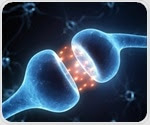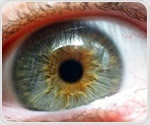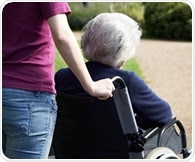| |  "Has this patient been drinking?" It's a critical question for neurosurgical nurses and other professionals when evaluating patients with traumatic brain injury. But some groups of TBI patients are less likely to be screened for alcohol use, including women and younger patients, reports a study in the March issue of the Journal of Neuroscience Nursing, official journal of the American Association of Neuroscience Nurses. "Has this patient been drinking?" It's a critical question for neurosurgical nurses and other professionals when evaluating patients with traumatic brain injury. But some groups of TBI patients are less likely to be screened for alcohol use, including women and younger patients, reports a study in the March issue of the Journal of Neuroscience Nursing, official journal of the American Association of Neuroscience Nurses. | |
|
| |  New behavioral neuroscience research suggests there's likely a connection between heading the ball in soccer and brain imbalance New behavioral neuroscience research suggests there's likely a connection between heading the ball in soccer and brain imbalance | |
|
| |  Taking menopausal hormone therapy soon after menopause to relieve symptoms may also benefit the brain, according to a study published in the March 21, 2018, online issue of Neurology, the medical journal of the American Academy of Neurology. Taking menopausal hormone therapy soon after menopause to relieve symptoms may also benefit the brain, according to a study published in the March 21, 2018, online issue of Neurology, the medical journal of the American Academy of Neurology. | |
|
| |  The team of María Domínguez, researcher for the Neuroscience Institute, joint venture of the Miguel Hernández University in Elche and the Spanish National Research Council, has managed to prove for the first time that an important factor in the development of acute pediatric lymphoblastic leukemia is inflammation. The team of María Domínguez, researcher for the Neuroscience Institute, joint venture of the Miguel Hernández University in Elche and the Spanish National Research Council, has managed to prove for the first time that an important factor in the development of acute pediatric lymphoblastic leukemia is inflammation. | |
|
| |  New research into Amyotrophic Lateral Sclerosis (ALS) - also known as motor neuron disease - shows that specific immune cells may help slow progression of the disease, an important step towards developing new therapies to treat patients. New research into Amyotrophic Lateral Sclerosis (ALS) - also known as motor neuron disease - shows that specific immune cells may help slow progression of the disease, an important step towards developing new therapies to treat patients. | |
|
| |  Understanding conscious perception is a major challenge for neuroscience. Understanding conscious perception is a major challenge for neuroscience. | |
|
| |  Women who have a high cardiovascular fitness in middle age have a risk of developing dementia when older that is almost 90 percent lower than among women in average physical condition, according to a study published in the journal Neurology. Women who have a high cardiovascular fitness in middle age have a risk of developing dementia when older that is almost 90 percent lower than among women in average physical condition, according to a study published in the journal Neurology. | |
|
| |  It's a paradox of Alzheimer's disease: Plaques of the sticky protein amyloid beta are the most characteristic sign in the brain of the deadly neurodegenerative disease. However, many older people have such plaques in their brains but do not have dementia. It's a paradox of Alzheimer's disease: Plaques of the sticky protein amyloid beta are the most characteristic sign in the brain of the deadly neurodegenerative disease. However, many older people have such plaques in their brains but do not have dementia. | |
|
| |  A team of University of Missouri neuroscientists are inching closer to developing the tools needed to decipher the brain. A team of University of Missouri neuroscientists are inching closer to developing the tools needed to decipher the brain. | |
|
| |  Until very recently, Parkinson's had been thought a disease that starts in the brain, destroying motion centers and resulting in tremors and loss of movement. Until very recently, Parkinson's had been thought a disease that starts in the brain, destroying motion centers and resulting in tremors and loss of movement. | |
|
| |  Immune cells called microglia can completely repopulate themselves in the retina after being nearly eliminated, according to a new study in mice from scientists at the National Eye Institute. Immune cells called microglia can completely repopulate themselves in the retina after being nearly eliminated, according to a new study in mice from scientists at the National Eye Institute. | |
|
| |  In a new study of one of the most common genetic causes of autism, neuroscientists at MIT's Picower Institute for Learning and Memory have identified a specific molecular mechanism that appears to undermine the ability of neurons in affected mice to properly incorporate changes driven by experience. In a new study of one of the most common genetic causes of autism, neuroscientists at MIT's Picower Institute for Learning and Memory have identified a specific molecular mechanism that appears to undermine the ability of neurons in affected mice to properly incorporate changes driven by experience. | |
|
| |  Researchers have discovered a "missing mutation" in severe infant epilepsy--long-suspected genetic changes that might trigger overactive, brain-damaging electrical signaling leading to seizures. Researchers have discovered a "missing mutation" in severe infant epilepsy--long-suspected genetic changes that might trigger overactive, brain-damaging electrical signaling leading to seizures. | |
|
| |  Neurologists at Stanford have developed a diagnostic tool that can translate the brain’s activity into sounds for the detection of silent seizures. Neurologists at Stanford have developed a diagnostic tool that can translate the brain’s activity into sounds for the detection of silent seizures. | |
|
| |  An international team of researchers led by John Landers, PhD, at UMass Medical School, and Bryan Traynor, MD, PhD, at the National Institute on Aging at the National Institutes of Health, has identified KIF5A as a new gene associated with the development of amyotrophic lateral sclerosis. An international team of researchers led by John Landers, PhD, at UMass Medical School, and Bryan Traynor, MD, PhD, at the National Institute on Aging at the National Institutes of Health, has identified KIF5A as a new gene associated with the development of amyotrophic lateral sclerosis. | |
|
| |  Prion diseases are progressive nervous system diseases which always have a fatal outcome. They are transmissible and affect many mammals. They are also called transmissible spongiform encephalopathies (TSEs). Prion diseases are progressive nervous system diseases which always have a fatal outcome. They are transmissible and affect many mammals. They are also called transmissible spongiform encephalopathies (TSEs). | |
|
| |  Researchers have developed an endoscope as thin as a human hair that can image the activity of neurons in the brains of living mice. Because it is so thin, the endoscope can reach deep into the brain, giving researchers access to areas that cannot be seen with microscopes or other types of endoscopes. Researchers have developed an endoscope as thin as a human hair that can image the activity of neurons in the brains of living mice. Because it is so thin, the endoscope can reach deep into the brain, giving researchers access to areas that cannot be seen with microscopes or other types of endoscopes. | |
|
| |  The time babies spend in the womb is far from idle. The brain is changing more rapidly during this time than at any other time in development. It is an active time for the fetus to grow and explore, and of course connect to its mother. The time babies spend in the womb is far from idle. The brain is changing more rapidly during this time than at any other time in development. It is an active time for the fetus to grow and explore, and of course connect to its mother. | |
|
| |  A Vancouver-based research team led by Canada's most cited neuroscientist, Dr. Patrick McGeer, has successfully carried out studies suggesting that, if started early enough, a daily regimen of the non-prescription NSAID (nonsteroidal anti-inflammatory drug) ibuprofen can prevent the onset of Alzheimer's disease. A Vancouver-based research team led by Canada's most cited neuroscientist, Dr. Patrick McGeer, has successfully carried out studies suggesting that, if started early enough, a daily regimen of the non-prescription NSAID (nonsteroidal anti-inflammatory drug) ibuprofen can prevent the onset of Alzheimer's disease. | |
|
| |  Choline intake during pregnancy can influence infant metabolism and brain development, according to a series of studies from the University of Illinois. Although the role of choline in neurodevelopment has been studied before in rodents, the new research, done with pigs, has more relevance to humans. Choline intake during pregnancy can influence infant metabolism and brain development, according to a series of studies from the University of Illinois. Although the role of choline in neurodevelopment has been studied before in rodents, the new research, done with pigs, has more relevance to humans. | |
|
| |  Years before people start showing characteristic symptoms of Alzheimer's disease, sticky plaques begin forming in their brains, damaging nearby cells. For decades, doctors have sought ways to clear out these plaques as a way to prevent or treat the disease. Years before people start showing characteristic symptoms of Alzheimer's disease, sticky plaques begin forming in their brains, damaging nearby cells. For decades, doctors have sought ways to clear out these plaques as a way to prevent or treat the disease. | |
|
| |  For children and adolescents who require medication to treat anxiety, there are two primary classes of antidepressants that are prescribed: selective serotonin reuptake inhibitors and selective serotonin-norepinephrine reuptake inhibitors. For children and adolescents who require medication to treat anxiety, there are two primary classes of antidepressants that are prescribed: selective serotonin reuptake inhibitors and selective serotonin-norepinephrine reuptake inhibitors. | |
|
| |  Dr Albert Hofmann, a Swiss chemist, first found the effects of LSD or lysergic acid diethylamide or “acid” on the psyche. It has been 75 years since his invention. Now new research finds deeper understanding of how this psychedelic chemical alters the perception and affects the brain. Dr Albert Hofmann, a Swiss chemist, first found the effects of LSD or lysergic acid diethylamide or “acid” on the psyche. It has been 75 years since his invention. Now new research finds deeper understanding of how this psychedelic chemical alters the perception and affects the brain. | |





























No hay comentarios:
Publicar un comentario